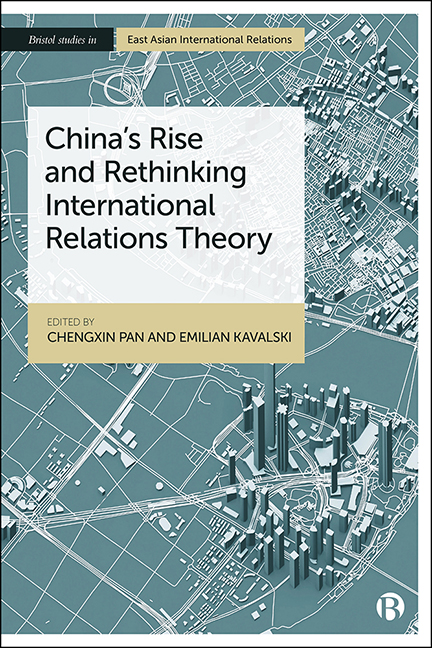Book contents
- Frontmatter
- Contents
- List of Abbreviations
- Notes on Contributors
- Acknowledgements
- Introduction: The Rise of China and Its Challenges to International Relations Theory
- PART I Theorizing China’s Rise: Beyond Eurocentric Knowledge Production
- PART II Theorizing China’s Rise: Critical Reflection on Mainstream Frameworks
- Epilogue: Towards International Relations beyond Binaries
- Index
5 - Re-Worlding the ‘West’ in Post-Western International Relations: The ‘Theory Migrant’ of Tianxia in the Anglosphere
Published online by Cambridge University Press: 15 September 2022
- Frontmatter
- Contents
- List of Abbreviations
- Notes on Contributors
- Acknowledgements
- Introduction: The Rise of China and Its Challenges to International Relations Theory
- PART I Theorizing China’s Rise: Beyond Eurocentric Knowledge Production
- PART II Theorizing China’s Rise: Critical Reflection on Mainstream Frameworks
- Epilogue: Towards International Relations beyond Binaries
- Index
Summary
Introduction
The International Relations (IR) discipline developed over the course of the 20th century has predominantly focused on the concerns of powerful Western states and has elaborated conceptual frameworks that could be applied elsewhere (Smith, 2002). Mainstream IR scholars treat different regions of the world as test cases for their theories rather than sources of theory in themselves. The ‘non-West’ becomes a domain that IR theorists perceive as backward, hence requiring instruction in order to reach the ‘End of History’ encapsulated by Western modernity (Fukuyama, 1992). In response, over the past two decades the discipline has witnessed a post-Western quest urging IR scholars to ‘re-World’ subaltern voices. From a post-Western perspective, no single modernity exists to which all actors must aspire and no actor or set of actors is reified. Rather, it seeks out multiple worlds and hidden voices (Ling, 2002).
In its quest to rediscover ‘non-Western’ worlds, post-Western IR urges scholars to re-world non-Western sites by examining how Western IR discourses have been interpreted and appropriated in each particular site over time. This allows the ever-changing and differing meanings of IR to be released from the monopolistic grasp by one exclusionary epistemology, whereby agency can be rediscovered at non-Western sites for adaptation, feedback and reconstruction of the Western influences. Such worlding of the non-Western worlds, if successful, exposes the ‘provincial’characteristics of the West, which has mistakenly presented itself as the universal, a result of Eurocentrism reinforced by the power of expansion (for example imperialism and post/neo-colonialism).
Nevertheless, a number of caveats exist concerning the post-Western exercise. First, post-Western IR seeks to provincialize ‘the West’ as an undifferentiated entity and yet strives to world non-Western sites each in their own differently different geo-cultural genealogies. Such endeavours risk the epistemological pretention that the provincial West cannot and should not be worlded. The West is reduced and yet simultaneously promoted to the status of an epistemologically unquestioned premise. Second, post-Western IR encourages site-centrism in its celebration of contextual alternatives to dominant Western discourses, institutions and values; yet, it faults the West for committing Eurocentrism when doing the same.
- Type
- Chapter
- Information
- China’s Rise and Rethinking International Relations Theory , pp. 102 - 122Publisher: Bristol University PressPrint publication year: 2022

